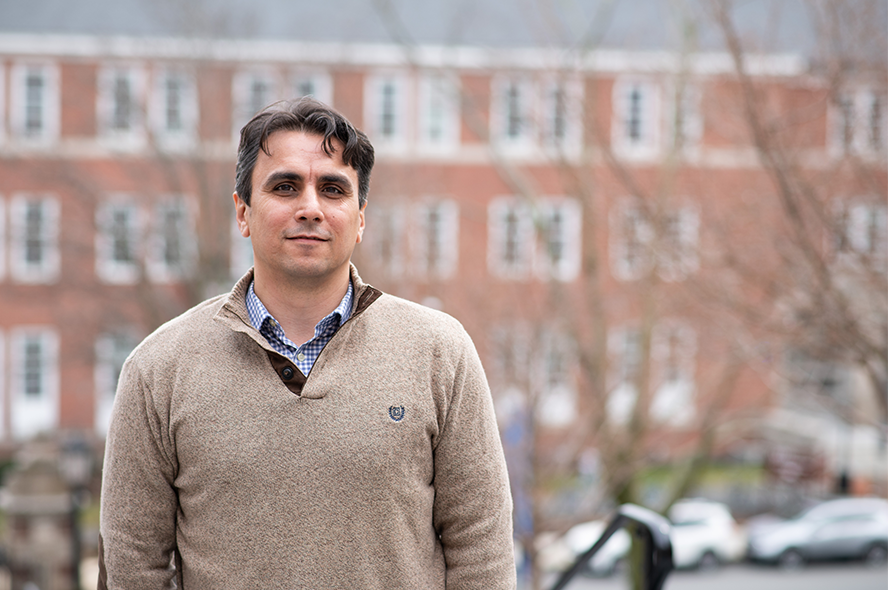Building a framework for equitable infrastructure in the face of climate change

Faculty members across Tufts University focus on issues relating to climate change and its effects on society. In the Department of Civil and Environmental Engineering, Professor and Berger Chair Farshid Vahedifard is dedicated to ensuring that current and future infrastructure can protect all communities against the intensifying effects of climate change. According to Vahedifard’s previous publications, historically underserved and socially vulnerable communities bear a disproportionate burden of climate change impacts such as exacerbated flooding, due to their pre-existing barriers, limited resources, lack of political power, and aging and marginal infrastructure.
Policymakers have begun to address these inequities with efforts such as the Justice40 Initiative, which directs 40% of the overall benefits of certain Federal investments – including investments in clean energy and energy efficiency, affordable and sustainable housing, and the development of clean water infrastructure – to flow to disadvantaged communities. Similarly, at the 2022 Conference of the Parties, the United Nations established a loss and damage fund to protect vulnerable countries against climate change related issues. Yet there is a notable absence of frameworks within the engineering and scientific fields for integrating equity into planning, design, and maintenance of infrastructure.
This increasingly prominent area of policy and investment focus led the American Society of Civil Engineers (ASCE) Committee on Adaptation to a Changing Climate and its Technical Committee on Future Weather and Climate Extremes to develop a framework that would ensure equitable access and benefits of infrastructure, minimize risk disparities in the face of climate change, and embrace restorative justice to repair historical and systemic inequities. The resulting paper was recently published in the open-access journal Proceedings of the National Academy of Sciences (PNAS) Nexus.
The large interdisciplinary team of authors included corresponding author Vahedifard and faculty members from University of California Irvine, University of California Davis, South Dakota School of Mines and Technology, Northeastern University, University of Buffalo, and Missouri University of Science and Technology, as well as representatives of religious organizations, engineering companies, and government organizations.
Titled “Equitable Infrastructure: Achieving Resilient Systems through Restorative Justice, Incremental Policy Innovation, and Exploratory Research Innovation”, the paper presents a three-pronged approach to equitable and resilient infrastructure. The team’s novel framework seeks to retroactively address past harms related to inequitable infrastructure while taking meaningful steps to ensure that future work will not replicate the same issues. The authors focus on three main goals – prioritizing equity in infrastructure decision-making, identifying and disrupting mechanisms that cause or contribute to inequities, and addressing and remediating historic harms.
Each aspect of the approach addresses a different phase of infrastructure development and maintenance. Restorative justice looks at resolving issues with pre-existing infrastructure, incremental policy innovation takes realistic steps to adjust current policies, and exploratory research innovation supports the future of equitable infrastructure development. While the framework presented in this paper focuses on the US, the researchers hope to eventually expand the principles to other areas of the world.
Among other action items, the authors recommend a certification system – referred to as Social, Environmental, and Economic Development (SEED) – to train infrastructure engineers and planners and ensure attentiveness to gaps that exist within and dynamically interact across each tier of the proposed framework. Through the framework and proposed actions, the authors advocate for a transformative vision for equitable and resilient infrastructure that emphasizes the interconnectedness of social, environmental, and technical dimensions in infrastructure planning, design, and maintenance.
Vahedifard joined Tufts in 2023 after conducting teaching and research at Mississippi State University. He is the Lead, Resilient and Equitable Infrastructure, at the United Nations University Institute for Water, Environment, and Health (UNU-INWEH). He earned his PhD in civil engineering from the University of Delaware. His work centers around studying the resilience and adaptation of critical infrastructure, including levees and dams, in the face of extreme events in a changing climate with an emphasis on addressing the needs and challenges historically underserved and socially vulnerable communities face. He aims to develop transformative solutions for emerging issues related to climate-resilient communities and infrastructure systems while incorporating environmental justice.
Department:
Civil and Environmental Engineering